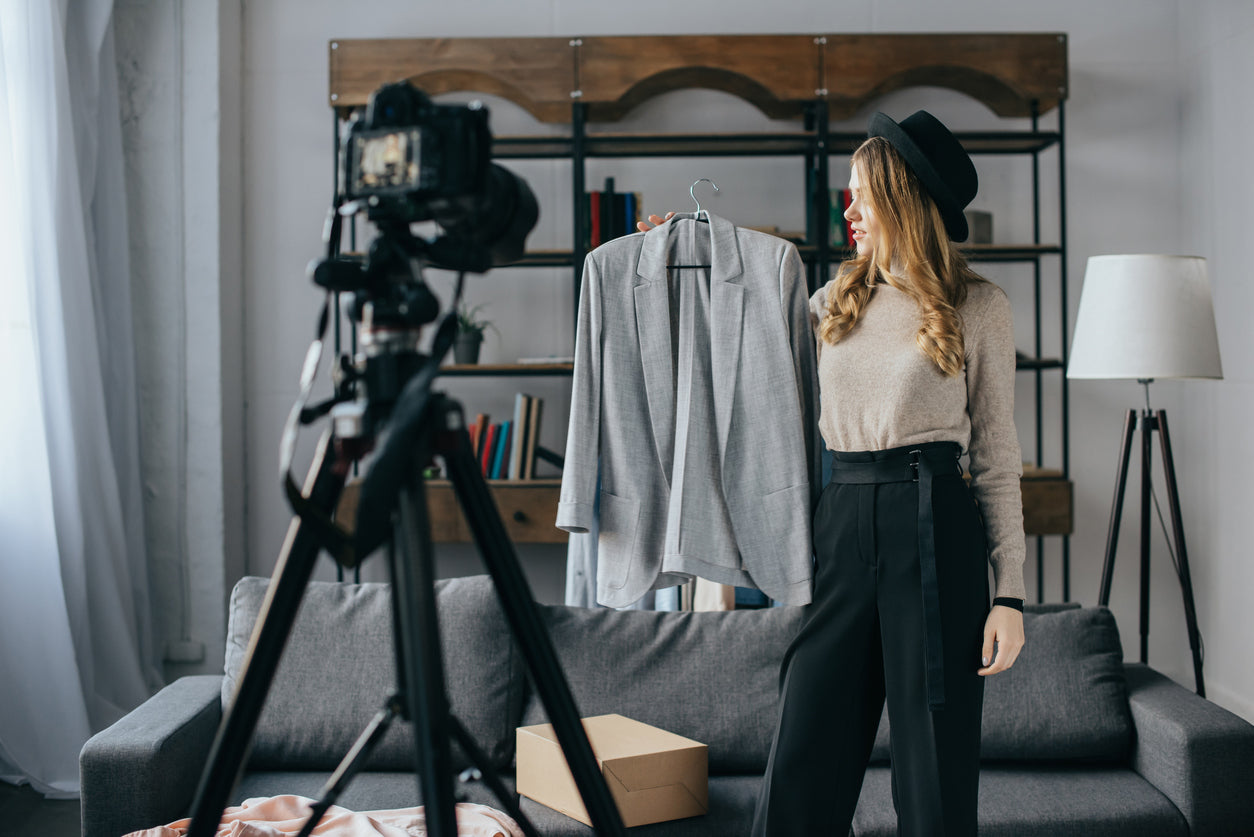Is An Obsession With Fashion Bad For Our Wellbeing?
First and foremost we want to make it clear, we’re not putting anyone down for loving fashion, I mean, if you’ve seen our social media you'll know that we make our fair share of fashion related posts!
There has been a huge change over the last few years however as a result of social media and the rise of fashion influencers, it’s probably fair to say that we’ve never been more exposed fashion.
Immaculately well dressed, seemingly perfect looking celebs and influencers are helping to fuel our desire for fashion, making us feel litke there's always something new to want. But is that drive for newness, partially driven by fashion being arguably cheaper than ever, really a positive thing for us?
First things first, let’s talk about sizing discrepancies. A size 10 in a shop like Zara could be a 14 somewhere else. Order online from a fast fashion site like Cider or Shein, and you might find that your pretty average ‘Western’ body needs to order a size double XL.
Shopping can be hugely demoralising and confusing, especially when so many of us have our self esteem wrapped up in our body image. Fitting into a pair of size 10 jeans (or not) could enhance our day, helping to make us feel great about ourselves, or it could have a real negative impact on our mood and resulting self-esteem.
Even though most of us are very aware of how much sizes vary between different shops, brands and even the same product, it can still impact us.
Have you ever bought one size of something, loved it and gone back and bought the exact same thing in the exact same size only to have it fit totally differently? It really does happen (yes ASOS, I'm talking about you), so we need to remind ourselves that the size label on the clothes we wear are pretty arbitrary.
Sizing is definitely a bit of a lottery and we know we shouldn’t take such minor things to heart, but even the most confident of us can’t help feeling slightly impacted by the size on our clothing labels.
Body positivity and fashion
The body positive movement is such a wonderful thing, liberating us from negative thoughts about our tums, thighs, wobbly bits, flat bits, too skinny bits, short bits, too long bits...teaching us to love ourselves no matter what shape or size we are.
Positivity in any guise is to be applauded and seeing a new generation of influencers from all walks of life, particularly those who don’t conform to conventional (and totally outdated) notions of beauty are where it’s at, and long may the movement continue to grow.
Young people are growing up seeing a more diverse set of role models, and fashion is slowly, ever so slowly, waking up and adapting to celebrating more diverse bodies and making their clothing more inclusive, but the fact is, we’re just not all the way there yet. Far from it.

Seeing more and wanting more
When young people see influencers on TikTok or Instagram involved in brand collaborations, posting pictures, videos and live streams of them in an ever changing array of gorgeous clothes and accessories, it’s difficult not to want those things too. It’s also hard not to wonder why you aren’t in their shoes and why it’s not you that has those things.
Even as a Gen X ‘grown up’ writing this, I can admit to being obsessed with TikTok and lusting after plenty of beautiful things I see people wearing. Even with a good handle on my finances, self esteem and a clear understanding that happiness comes from within and not from ‘stuff’ I still find myself coveting and wanting some of the things I see and occasionally, knowing I can’t have them can even leave me feeling a little miffed.
So now lets think of someone much younger who hasn’t yet figured out that stuff doesn’t equal happiness or that being popular doesn't depend on having loads of stuff and wearing what the coolest influencers and fashion mags are endorsing.
A constant parade of fashionable influencers and even friends on social media who seem to have more than they do can easily fuel a sense a dissatisfaction, or worse, of not being good enough which can contribute to low self esteem and generally feeling a bit rubbish.
When my daughter started high school there was always pressure to have the latest Nike trainers and to have the best new phone. Thankfully social media was still in it’s infancy back then, so she didn’t have that added pressure, but it can be tough.
These societal norms and pressures really can have a negative impact on wellbeing that’s embedded in us from a young age, eating away at us, making us feel like we're not quite good enough and driving insecurities.
The Love Island effect
This leads me to talk about the inescapable phenomenon that has come to signal the start of summer on our TV screens, and that’s Love Island. Love it or loathe it, the power it has over young people is immense and cannot be underestimated.
In years gone by the contestants were sponsored by fast fashion brands. In June 2019 a fast fashion brand we won’t name, advertised a bikini with a price tag of £1. That’s not a typo. That’s £1.
The knee jerk reaction of the bargain conscious might have been “what a great price I’m going to buy that!”, but when we start to break down production costs, materials costs, cost of sales and so on, it’s obvious that such a product is being sold at a loss.
The Conversation states “Excessively low price points encourage a throwaway culture by implying that clothing has no value.” Not only that, these low prices could instill a sense of entitlement that drives a relentless, vacuous consumerism.
I mean I wonder how many people who bought that £1 product really needed a bikini and how many bought it simply because they could?
We’ve already talked about the impact of fast fashion on the planet and we’ve suggested ways to shop more sustainably, but how about taking our wellbeing into account when we’re making purchasing decisions?
Is that cheap product we don’t need really going to do us any good? Yes, we’ll get a little feel-good dopamine hit when we click the buy button. We’ll get another one when we answer the door and open the package and see it for the first time, then another one when we try it on or wear it for the first time. But after that? It was cheap. Meh, on to the next thing already.
So should we be doing more to think about purchases that support our wellbeing on a deeper level rather than giving us a temporary ‘happy’ hit? A hit that quickly diminishes and as soon as we see the next advert for a random TikTok shop product that’s too cheap to ignore, and we enter the whole cycle again.
Let’s think more about what we buy
Some people have conducted radical experiments, pledging to buy nothing new (apart from groceries and absolute household essentials) for an entire year. Frankly the idea brings me out in a cold sweat, but could we experiment ourselves and perhaps put a limit on the number of impulse buys (i.e. stuff we want but don’t need) that we allow ourselves each month?
Could we look at investing in things that support our wellbeing instead? How about starting that weekly yoga class you’ve been thinking about or getting back into the crafting hobby you used to love? Investing into spending more time outside, going to new places and having new experiences instead of buying more stuff?
It’s definitely something to think about.
You can prolong the use of your clothing by using Holé button covers that can help protect your tops from the everyday wear and tear than can lead to tiny holes appearing and ruining your tops.

